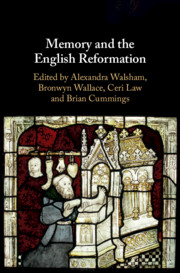Book contents
- Memory and the English Reformation
- Memory and the English Reformation
- Copyright page
- Dedication
- Contents
- Figures
- Contributors
- Preface and Acknowledgements
- Abbreviations
- Introduction
- Part I Events and Temporalities
- 1 Nailing the Reformation
- 2 Remembering the Dissolution of the Monasteries
- 3 Remembering the Past at the End of Time
- 4 Henry VIII’s Ghost in Cromwellian England
- 5 Remembering Mary, Contesting Reform
- 6 Converting the Cross
- Part II Objects and Places
- Part III Lives and Afterlives
- Part IV Rituals and Bodies
- Index
1 - Nailing the Reformation
Luther and the Wittenberg Door in English Historical Memory
from Part I - Events and Temporalities
Published online by Cambridge University Press: 30 October 2020
- Memory and the English Reformation
- Memory and the English Reformation
- Copyright page
- Dedication
- Contents
- Figures
- Contributors
- Preface and Acknowledgements
- Abbreviations
- Introduction
- Part I Events and Temporalities
- 1 Nailing the Reformation
- 2 Remembering the Dissolution of the Monasteries
- 3 Remembering the Past at the End of Time
- 4 Henry VIII’s Ghost in Cromwellian England
- 5 Remembering Mary, Contesting Reform
- 6 Converting the Cross
- Part II Objects and Places
- Part III Lives and Afterlives
- Part IV Rituals and Bodies
- Index
Summary
This chapter examines the place in English history memory of what is generally considered the original ‘event’ of the Reformation: Martin Luther’s posting of the Ninety-five Theses to the door of the Castle Church in Wittenberg on 31 October 1517. Despite its uncertain historical veracity, the episode was prioritised by the ideological demands of the first Reformation centenary celebrated in Germany in 1617, and thereafter (particularly in the nineteenth century) it became a magnet of Protestant artistic expression and cultural identity. In England, however, interest in Luther’s ‘Thesenanschlag’ remained remarkably muted through the seventeenth and eighteenth centuries. Even in 1817, when a commemorative impulse fired by imaginative remembering of the episode swept through Lutheran Germany, Scandinavia and the United States, English interest remained muted. Across the nineteenth century as a whole, non-conformists were much more likely than Anglicans to celebrate the valour and significance of Luther’s ‘deed’. The reticence points to a long-standing reluctance among Anglicans to acknowledge Luther, even at a remove, as a founder of the Church of England. Yet a long-standing failure to advance consensually any alternative date or event as the foundational moment of the English Reformation is striking, underlining the unresolved tension over continuity versus rupture which lies at the heart of Anglican historical identity.
Keywords
- Type
- Chapter
- Information
- Memory and the English Reformation , pp. 49 - 63Publisher: Cambridge University PressPrint publication year: 2020
- 1
- Cited by



